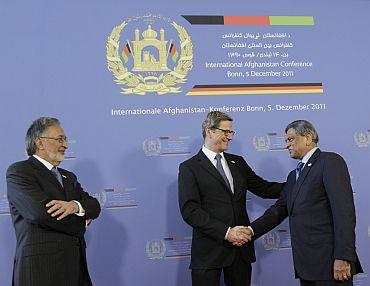 Hinting at Pakistan, India on Monday said terrorism emanating from outside Afghan borders posed potent threat to Afghanistan and warned that the war-torn country could "slip back" by interference in its internal affairs.
Hinting at Pakistan, India on Monday said terrorism emanating from outside Afghan borders posed potent threat to Afghanistan and warned that the war-torn country could "slip back" by interference in its internal affairs.
Addressing a conference of over 100 countries in Bonn, Germany, External Affairs Minister S M Krishna underlined India's pledge to support Afghanistan's development while underlining that the world community's commitment to ensuring its stability and security should not end after international forces leave that nation in 2014.
Afghanistan "continues to face a potent threat to its security from terrorism and insurgency being fuelled from outside its borders," he said, in an apparent reference to Pakistan without naming it.
Talking about the proposal for withdrawal of international forces from Afghanistan in 2014, he said there was "a real danger" that there will be "a transition recession; i.e. that attention and aid will decline, just as the Afghan government's security demands increase."
Krishna emphasised the need for averting the possibility "that Afghanistan is let down or made to feel abandoned by, at least in terms of quantity, if not quality," of international assistance required in the era after 2014.
"We should not make the mistakes of the past and let Afghanistan slip back. We must ensure that Afghanistan's security is ensured through non-interference in its internal affairs," he said at the conference being boycotted by
Pakistan but attended by world leaders including US Secretary of State Hillary Clinton and British Foreign Minister William Hague.
Krishna said the international community had come to Afghanistan as it was under the control of an extremist ideology and under the influence of foreign countries and had become a sanctuary for international terror.
"Terrorism radiated outwards to the region, affecting firstly India, and then other countries. It culminated in the September 11, 2001 terror attacks," he said.
The external affairs minister said the international community then decided that this would not stand, that this bastion of extremism and terrorism was a threat to mankind and had to be replaced.
"Today, we have to ask ourselves, if that job is done, whether we have succeeded in eliminating terrorism, and the safe havens and sanctuaries from where it is emanating, right from its source," he said.
"We have to ask whether, if we withdraw our holding hand, Afghanistan will be able to withstand the forces of radicalism, extremism and violence, and stand on its own feet," he said.
The answer to this question should decide the nature and level of long-term engagement with Afghanistan, Krishna said.
He said Afghanistan faced deficits on four fronts -- security, governance, development and investment and needed international assistance to face these challenges.
Krishna said political commitments and conference decisions alone were not enough and there was a need to back up the commitments with both resources and actions.
Noting that India was willing to contribute its share, he said Prime Minister Manmohan Singh had pledged an additional $ 500 million to its development effort for Afghanistan until the period 2014.
This was in addition to the $1.5 billion India has already pledged to Afghanistan.
Krishna said India has announced the virtual elimination of sensitive lists affecting exports of all least developed SAARC countries to India, including Afghanistan.
India is also assisting Afghanistan in building an Agricultural University to tap the potential in agriculture in that country, he said.
"We have extended our assistance to Afghanistan for capacity building; increased the number of civil scholarships offered to Afghanistan to enable more students from Afghanistan get requisite training in art, culture and technology, among other areas, to further the process of nation building in Afghanistan," he said.
Krishna said India was also prepared to make long-term investments in Afghanistan and Indian companies were willing to invest up to $10 billion in mining, setting up of a steel plant and related infrastructure in Afghanistan.
"These are concrete manifestations of our long-term political commitment to Afghanistan. If others do the same, we could set off a virtuous cycle of healthy economic competition in Afghanistan that benefits Afghanistan and the region," Krishna said.
Image: S M Krishna (R) meets with his counterparts of Germany Westerwelle and Afghanistan counterpart Rassul at the International Afghanistan Conference in Bonn on Monday
Photograph: Reuters







 © 2025
© 2025